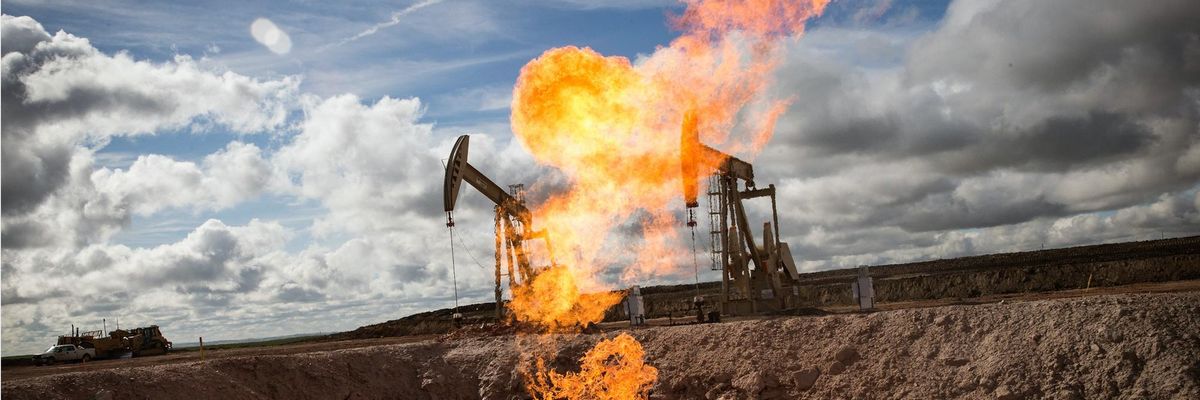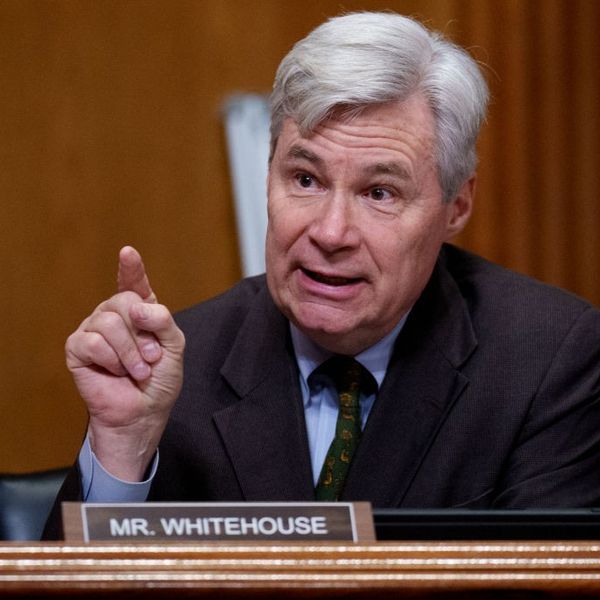
A gas flare is seen at an oil well site on July 26, 2013 outside Williston, North Dakota.
Just 'Stop Drilling,' Critics Say After Biden Admin Finalizes Methane Limits
The new Biden administration rule will limit methane emissions, but critics say it's time to stop drilling for fossil fuels.
The Biden administration on Tuesday finalized rules that will force oil and gas companies to reduce their methane emissions, but critics say the administration needs to do more to curb a key driver of the planet-warming pollution: fossil fuel drilling.
Methane is a potent greenhouse gas, and the Bureau of Land Management's new rules will require that fossil fuel companies contain methane leaks at oil and natural gas wells that are on federal land, and they will also have to limit how much methane they burn off.
Critics say the only solution that will truly address the climate crisis is to stop drilling entirely. Recently released Interior Department data shows that the Biden administration has approved close to 50% more oil and gas drilling permits on public lands than the Trump administration did during its first three years.
"The best way to eliminate methane pollution from public lands is to stop fossil fuel drilling, period. In the midst of a climate emergency, we need to take the actions necessary to stop pollution once and for all," Food & Water Watch Policy Director Jim Walsh said in a statement. "We look forward to working with climate champions in Congress like Rep. Jan Schakowsky to pass the Future Generations Protection Act to ban fracking on public lands and everywhere else."
Some praised the new rules as needed progress, including Sen. Ed Markey (D-Mass.).
America’s public lands should be sources of inspiration and joy, not pollution and waste. I applaud @Interior for working to stop releases of methane, a major climate pollutant, on our public lands—something I've been demanding for years with my FLARE Act. https://t.co/D1o26GEc55
— Ed Markey (@SenMarkey) March 27, 2024
Interior Secretary Deb Haaland said in a statement Tuesday that “this final rule, which updates 40-year-old regulations, furthers the Biden-Harris administration’s goals to prevent [methane] waste, protect our environment and ensure a fair return to American taxpayers.”
Methane can trap far more heat than CO2, so limiting emissions is a critical part of addressing the climate crisis. Despite pledging to cut methane emissions, oil and gas companies have not significantly reduced emissions in recent years. The U.S. is currently the largest emitter of methane from oil and gas in the world.
The International Energy Agency says major reductions in methane emissions need to be made if the world is going to avert catastrophic global warming.
An Urgent Message From Our Co-Founder
Dear Common Dreams reader, The U.S. is on a fast track to authoritarianism like nothing I've ever seen. Meanwhile, corporate news outlets are utterly capitulating to Trump, twisting their coverage to avoid drawing his ire while lining up to stuff cash in his pockets. That's why I believe that Common Dreams is doing the best and most consequential reporting that we've ever done. Our small but mighty team is a progressive reporting powerhouse, covering the news every day that the corporate media never will. Our mission has always been simple: To inform. To inspire. And to ignite change for the common good. Now here's the key piece that I want all our readers to understand: None of this would be possible without your financial support. That's not just some fundraising cliche. It's the absolute and literal truth. We don't accept corporate advertising and never will. We don't have a paywall because we don't think people should be blocked from critical news based on their ability to pay. Everything we do is funded by the donations of readers like you. Will you donate now to help power the nonprofit, independent reporting of Common Dreams? Thank you for being a vital member of our community. Together, we can keep independent journalism alive when it’s needed most. - Craig Brown, Co-founder |
The Biden administration on Tuesday finalized rules that will force oil and gas companies to reduce their methane emissions, but critics say the administration needs to do more to curb a key driver of the planet-warming pollution: fossil fuel drilling.
Methane is a potent greenhouse gas, and the Bureau of Land Management's new rules will require that fossil fuel companies contain methane leaks at oil and natural gas wells that are on federal land, and they will also have to limit how much methane they burn off.
Critics say the only solution that will truly address the climate crisis is to stop drilling entirely. Recently released Interior Department data shows that the Biden administration has approved close to 50% more oil and gas drilling permits on public lands than the Trump administration did during its first three years.
"The best way to eliminate methane pollution from public lands is to stop fossil fuel drilling, period. In the midst of a climate emergency, we need to take the actions necessary to stop pollution once and for all," Food & Water Watch Policy Director Jim Walsh said in a statement. "We look forward to working with climate champions in Congress like Rep. Jan Schakowsky to pass the Future Generations Protection Act to ban fracking on public lands and everywhere else."
Some praised the new rules as needed progress, including Sen. Ed Markey (D-Mass.).
America’s public lands should be sources of inspiration and joy, not pollution and waste. I applaud @Interior for working to stop releases of methane, a major climate pollutant, on our public lands—something I've been demanding for years with my FLARE Act. https://t.co/D1o26GEc55
— Ed Markey (@SenMarkey) March 27, 2024
Interior Secretary Deb Haaland said in a statement Tuesday that “this final rule, which updates 40-year-old regulations, furthers the Biden-Harris administration’s goals to prevent [methane] waste, protect our environment and ensure a fair return to American taxpayers.”
Methane can trap far more heat than CO2, so limiting emissions is a critical part of addressing the climate crisis. Despite pledging to cut methane emissions, oil and gas companies have not significantly reduced emissions in recent years. The U.S. is currently the largest emitter of methane from oil and gas in the world.
The International Energy Agency says major reductions in methane emissions need to be made if the world is going to avert catastrophic global warming.
- 'Trashing the Climate': EPA Failing to Address Massive Methane Emissions From Landfills ›
- Researchers Worry Methane Discovery in Arctic Ocean Could Signal Dangerous New Climate Feedback Loop ›
- Study Shows Methane Leaks Put Climate Risk From Gas 'On Par With Coal' ›
- Defusing 'Methane Bombs' Key to Averting Climate Catastrophe: Experts ›
The Biden administration on Tuesday finalized rules that will force oil and gas companies to reduce their methane emissions, but critics say the administration needs to do more to curb a key driver of the planet-warming pollution: fossil fuel drilling.
Methane is a potent greenhouse gas, and the Bureau of Land Management's new rules will require that fossil fuel companies contain methane leaks at oil and natural gas wells that are on federal land, and they will also have to limit how much methane they burn off.
Critics say the only solution that will truly address the climate crisis is to stop drilling entirely. Recently released Interior Department data shows that the Biden administration has approved close to 50% more oil and gas drilling permits on public lands than the Trump administration did during its first three years.
"The best way to eliminate methane pollution from public lands is to stop fossil fuel drilling, period. In the midst of a climate emergency, we need to take the actions necessary to stop pollution once and for all," Food & Water Watch Policy Director Jim Walsh said in a statement. "We look forward to working with climate champions in Congress like Rep. Jan Schakowsky to pass the Future Generations Protection Act to ban fracking on public lands and everywhere else."
Some praised the new rules as needed progress, including Sen. Ed Markey (D-Mass.).
America’s public lands should be sources of inspiration and joy, not pollution and waste. I applaud @Interior for working to stop releases of methane, a major climate pollutant, on our public lands—something I've been demanding for years with my FLARE Act. https://t.co/D1o26GEc55
— Ed Markey (@SenMarkey) March 27, 2024
Interior Secretary Deb Haaland said in a statement Tuesday that “this final rule, which updates 40-year-old regulations, furthers the Biden-Harris administration’s goals to prevent [methane] waste, protect our environment and ensure a fair return to American taxpayers.”
Methane can trap far more heat than CO2, so limiting emissions is a critical part of addressing the climate crisis. Despite pledging to cut methane emissions, oil and gas companies have not significantly reduced emissions in recent years. The U.S. is currently the largest emitter of methane from oil and gas in the world.
The International Energy Agency says major reductions in methane emissions need to be made if the world is going to avert catastrophic global warming.
- 'Trashing the Climate': EPA Failing to Address Massive Methane Emissions From Landfills ›
- Researchers Worry Methane Discovery in Arctic Ocean Could Signal Dangerous New Climate Feedback Loop ›
- Study Shows Methane Leaks Put Climate Risk From Gas 'On Par With Coal' ›
- Defusing 'Methane Bombs' Key to Averting Climate Catastrophe: Experts ›

